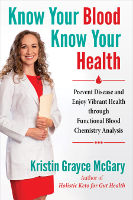
Image by Sergei Belozerov. Background image by bartekhdd.
Narrated by Marie T. Russell.
The human body is an amazing thing, full of systems, organs, nerves, and vessels that work together in harmony to keep us going in our daily activities. Writers and poets, with their infinite imagination, have used many different analogies for the human body to help people better understand this fantastic vessel we occupy.
You’ve seen the body described as a machine, as a city, or even as a factory. These are all helpful analogies in understanding how the different systems and parts of the body work together as a whole. But I like to take a different approach.
Get The Latest By Email
I view the body as a garden, an analogy that I borrowed from ancient Asian influences. I feel this analogy best encompasses not only how the body works but how we should care for it.
A Complete View of the Body's Environment
As a holistic and preventative healthcare practitioner, this view influences how I work with my patients. I dig deep into labs, intake forms, and one-on-one consultations looking for all the details to get a complete view of my patients’ bodies, mind, and life. The view of the body as a garden incorporates aspects of functional medicine and then takes it several steps beyond. The analogy is not only beautiful, it’s accurate.
Consider how a garden requires nutrients to keep the soil healthy, sunshine and water to help plants grow, and tending from the gardener to help the garden produce. The body is the same. We all require nutrients, sunshine, and water to live, and a good relationship with a doctor as gardener can help improve our health outcomes.
Your beautiful garden is intimately connected to and impacted by the surrounding elements. In Western philosophy, those elements are water, fire, metals, and air, but in Asian medicine we go much deeper, working with fire, earth, metal, water, and wood elements. For example, droughts, bug infestations, chemical-laden air, floods, or fire can wreak havoc on your body.
Just like a garden full of plants is connected to, influenced by, and even dependent on the environment and the outside care it receives, so is your body. A flood can cause damage to your home, which leads to stress and even illness from lingering mold.
Outside Influence and Advice
In addition to the environmental influences, our gardens and bodies are also influenced by those around us. If you get poor advice from someone to plant a particular crop in the wrong season, do you blame the garden when it doesn’t thrive? Those plants did their best in the conditions in which they were planted, but they were influenced by the advice you received and your implementation of the plan. If the person who gave you that advice was attempting to be helpful and was giving out incorrect information unknowingly, would you blame them? Of course not.
Let’s say your garden is doing great. You planted the lettuce, kale, and carrots in the spring, watered them religiously, and provided lovely raised garden beds to allow them to grow strong. Then all of a sudden, among all the blooms and promise of a bountiful harvest, you see small hungry caterpillars and aphids eating away at the leaves of your plants.
You go to a friend to ask for help, and they suggest a solution: a toxic pesticide. Not knowing there’s another, more natural option, you use that pesticide to rid your garden of the beetles eating your plants in the hopes that you’ll still be able to harvest lettuce, kale and carrots in the future.
This same analogy applies to your health. When you don’t feel well, you seek help from others for solutions, even the internet. You might be recommended certain medications that treat your symptoms, and you take them without knowing that they can cause side effects, even accumulated toxicity and organ damage.
There are other options out there, but often the people we go to for advice don’t know about those alternatives. Western doctors are well versed in pharmaceuticals and understand their benefits and side effects, but these doctors often receive no training in nutrition and natural remedies that have a beneficial impact on your entire ecosystem.
The Gardener's Task
Your garden isn’t static; it’s in flow with the elements that surround it, and so is your body. Your body is designed to thrive, to allow you to live a healthy life and enjoy many activities, just like a healthy garden produces vibrant vegetables and fruits.
In order to achieve this bountiful harvest, your body must be listened to and honored. It requires a gardener who pays attention to the weather, who notices a small invasive bug on one leaf before there are thousands, who can give the proper soil nutrients before it is depleted, who understands which season is best for planting, harvesting, and turning the soil.
The gardener is your healthcare provider, who works in harmony with the elements as well. She doesn’t fight the rain or drought, but instead creatively works with the external environment by applying specific tools to address the seasonal circumstances.
If a grub or some other pest is found, rather than killing every single microbe in the soil to eradicate the one, the gardener works to create a balance that discourages the bad bugs and encourages the good soil microbes by increasing the nutrients that support that system. The same is true in the body. When a symptom of a disease appears, your healthcare provider should work with you to pinpoint the issue and find balance to encourage a healthy lifestyle.
Think of the common practice of giving an antibiotic for a mild illness. That medication may wipe out the good flora in your gut while turning your natural immune system off, instead of increasing your immune system’s response to fight things in a more efficient way. Antibiotics can be appropriate in some instances, but I’ve found them to be very over-prescribed and often misused.
Working in Harmony with the Whole Body
Your body should be a flourishing garden; however, very few people feel that they are radiant, full of energy, and thriving. Most people have nagging symptoms, feel tired, have brain fog or memory issues, suffer from blood sugar imbalances that affect their mood, have pain, hormone fluctuations, depression, anxiety, obesity, stress, or sleep issues.
I’ve found that the best gardens are those that have master gardeners working in harmony with them. They have the information, understanding, and tools to accommodate every aspect of the garden and ecosystem. For the human garden, that should include finding a doctor who will work to improve your whole health.
Contrast this garden analogy with the Western medical view of your body as a machine. In this model, individual parts are separate. The motor is not necessarily associated with the brakes and brake fluid. The tire pressure is usually not considered when you’re getting low gas mileage.
When things aren’t running well, you likely will be directed to remove and replace the spark plugs. Parts can be replaced for new ones without much consideration for the other parts and how they interact. The mechanic learns the parts, hopefully where to get the most reliable ones, how to replace them, and when to replace them (which translates to when they are completely worn out and the car can’t run without them).
There is nothing wrong with this model. It serves its purpose as one way of explaining body systems. It’s just not the one I choose to use, especially when it comes to your health, because it is incomplete. If my arm has a compound fracture and the bone is sticking out of my skin, I’m going to go to the emergency room for treatment and desire the best mechanic on staff to fix that bone.
But I won’t stop there. The “mechanic” fixed the immediate problem, but there is more to consider, which is where the gardener comes in. Going to a gardener rather than or in addition to a mechanic, or a holistic healthcare provider rather than or in addition to a Western-trained physician, you will also get holistic peri-neural injection therapy for pain, neural therapy for the trauma, homeopathics to stimulate the healing process, and receive advanced craniosacral therapy to address the trauma from the repair surgery as well as whatever caused the break, all of which will help you heal more quickly.
Finding and Preventing Problems Before They Occur
Continuing with this analogy, let’s look at the annual physical exam. When you take your car in for maintenance, the mechanic may check the oil, the windshield washer fluid, the brake fluid, and so on, run a few diagnostic tests and then send you on your way. This is similar to the Western medical model for annual exams.
The best mechanic finds things before they are broken, helping you avoid being stranded on the side of the road, facing a high repair bill. However, these types of mechanics (doctors) are far and few between because our current healthcare system doesn’t support that kind of mechanic. The majority of doctors are taught to have a very specialized and often narrow focus of the body, a system, or region. This limits their ability to see the whole picture of the body, with all its parts and how they run together.
I believe that in the best system, the gardener and mechanic work together, so you get the best of both worlds. You go to a specialist (mechanic) when you have a broken arm to have them fix your broken bone, then supplement that with a holistic healthcare practitioner (gardener) who takes a holistic approach to healing and helps you understand the best way to health.
Bridging The Gap
Bridging the gap between the Western medical model (body as a machine) and the Asian medical model (body as garden), the functional medical model ideally sees the body as a combination of the two. Looking at functional medicine as a combination of the two keeps us from putting one ahead of the other in importance.
There is a place for the mechanic as well as the gardener. Finding holistic healthcare providers who understand these philosophies will prevent you from falling through the cracks of the current healthcare system, enabling you to solve your health puzzle and prevent future suffering while offering you vibrant and lasting wellness.
Copyright 2020. All Rights Reserved.
Reprinted with permission of the publisher,
Findhorn Press, an imprint of Inner Traditions Intl.
Article Source
Know Your Blood, Know Your Health: Prevent Disease and Enjoy Vibrant Health through Functional Blood Chemistry Analysis
by Kristin Grayce McGary, L.Ac., M.Ac., CFMP, CST-T, CLP
 A guide to accurate, individualized blood test analysis for improving personal health and avoiding disease. • Explains the differences between conventional lab reference ranges for blood tests and functional analysis and why the difference is important to your health • Reveals what healthy blood should look like and the critical markers that signal the very beginnings of a health problem, including thyroid dysfunction and inflammation • Provides recommendations for bringing blood markers back to an optimal healthy range through diet and supplementation
A guide to accurate, individualized blood test analysis for improving personal health and avoiding disease. • Explains the differences between conventional lab reference ranges for blood tests and functional analysis and why the difference is important to your health • Reveals what healthy blood should look like and the critical markers that signal the very beginnings of a health problem, including thyroid dysfunction and inflammation • Provides recommendations for bringing blood markers back to an optimal healthy range through diet and supplementation
For more info and/or to order this book, click here.
About the Author
 Kristin Grayce McGary, L.Ac., M.Ac., CFMP, CST-T, CLP, is an internationally recognized authority on autoimmunity, functional blood chemistry analysis, the thyroid, and gut health. She is a health and lifestyle teacher and author of Holistic Keto for Gut Health.
Kristin Grayce McGary, L.Ac., M.Ac., CFMP, CST-T, CLP, is an internationally recognized authority on autoimmunity, functional blood chemistry analysis, the thyroid, and gut health. She is a health and lifestyle teacher and author of Holistic Keto for Gut Health.
Visit her website at: KristinGrayceMcGary.com/










